|
1.
CENTRAL AND WEST AFRICA
Slow demand in Asian and Middle East markets
Operators in the region report market conditions are not
favourable and that this has led to the closure of some
mills in Gabon and Congo, particularly those operated by
Chinese and Indian companies. Asian and Middle East
markets are experiencing reduced demand particularly for
some prime species such as okoume. The trade hopes for a
revival of business with China and Vietnam after the 10
February New Year celebrations.
Weather conditions improved
Gabon is currently experiencing the dry season which
allows maintenance of the roads but trucking remains
problematic due to damaged bush roads. As Gabon's
timber industry embraces the dry season challenges persist
as log stocks need to be rebuilt.
Similarly, in Cameroon harvesting remains challenging
due to the lingering effects of heavy rain. With the arrival
of the dry season, expected to last until June, forest
operations and trucking will return to normal.
In Congo the dry season has commenced facilitating a
return to harvesting activities. The North experiences a dry
season for six months, mirroring conditions in Gabon, but
parts of the country anticipate rain to return at the end of
February.
Regional round-up
In Cameroon it is the time for businesses to renegotiate
concession agreements, a regular occurrence. While major
timber companies have harvesting concessions some also
acquire a portion of their logs from small scale operators
through the so-called ‘vente de coupe’ system.
See: (https://www.linguee.com/french-english/translation/vente+de+coupe.html).
One observer has said “obtaining a legitimate EUTR
document for such operations will prove challenging due
to the numerous ‘vente de coupe’, many of which lack
clear legal ownership”.
The new government in Gabon is emphasising total
control over institutions, ministries, management, finances
and workforce aiming to eliminate corrupt practices.
The government's initial mandate of 20% expatriates for
operators is impacting production and has been met with
concern. The government, in collaboration with operators,
has adopted a more flexible plan, allowing for a range of
20% to 25% expatriates to address operational needs and
industry concerns.
In related news, the domestic press in Gabon has
reportedAfrica Global Logistic (ex Bolloré) intends to
invest around CFA 20 billion in redevelopment and
modernisation of Owendo Port and Port Gentil.
The announcement was made by AGL's Director General
of Ports and Terminals, Olivier de Noray, during a
meeting with the Prime Minister of the transition
government.
See:
https://www.lenouveaugabon.com/fr/transports-logistique/2212-20232-agl-prevoit-d-investir-20-milliards-fcfa-d-ici-avril-2024-pour-le-reamenagement-des-ports-d-owendo-et-de-port-gentil
Mill production down in third quarter in Gabon
According to data from the Ministry of the Economy
activity in the timber industries in Gabon at the end of the
third quarter of 2023 fell by 17% quarter-on-quarter. The
decline was attributed mainly to the decline in orders from
buyers for the Asian markets. The slowdown was made
worse by difficulties operators had in transporting goods
as the highways were in bad condition.
At the end of the third quarter of 2023 sawmill production
was down 13%, veneer output fell 22% and plywood
producers saw an 8% drop in business compared to the
second quarter of 2023.
See:
https://www.lenouveaugabon.com/fr/agro-bois/1212-20223-industrie-du-bois-la-baisse-des-commandes-asiatiques-fait-chuter-l-activite-au-gabon
Production in Congo is expected to be stable for the next
two months and with a suspension of the log export ban
the export quota system will be reintroduced. However,
the market situation is concerning with low demand,
notably from the Philippines, which is slowing down
purchases of okoume sawnwood. This downturn has
prompted operators to reduce their workforce.
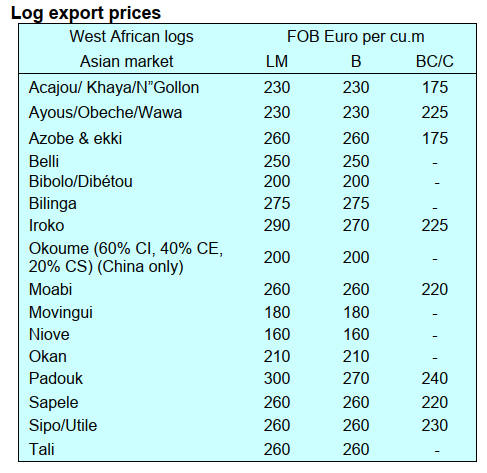
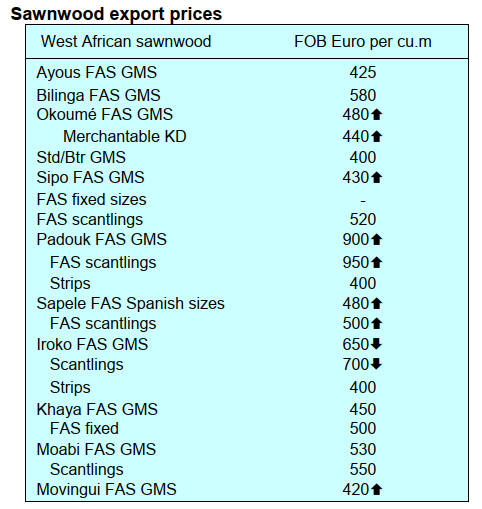
EUDR webinar
ATIBT has announced an open invitation for a webinar on
the EUDR with two objectives: to present the EUDR and
to provide answers to questions and concerns of timber
industry players operating in Central and West Africa. The
webinar will be held online on Thursday 25 January from
8.30am GMT (9.30am Paris time).
Register at:
https://us06web.zoom.us/meeting/register/tZ0oduCprzMoG9YCLYc8Zs4YXIXYfcpaf9YI#/registration
2.
GHANA
Industrialisation through sustainable and
efficient
supply chains
The Association of Ghana Industries (AGI) held its 63rd
Annual General Meeting on the theme ‘Industrialisation
Through Sustainable and Efficient Supply Chains’. The
event gathered over 250 industrialists drawn from all 16
regions who are focused on promoting industrialisation
through sustainable and efficient supply chains.
The AGI president, Dr. Kwesi Humphrey Ayim Darke,
said there is no doubt that we have gone through turbulent
times as an association and as a nation. Despite the
headwinds the resilience to strive on and move forward is
apparent as is our total commitment to an improved
business environment for Industry.
He added “to strengthen our advocacy in that direction,
AGI has been at the forefront of multi-stakeholder
engagements with government; and I am glad our efforts
are yielding results”. Dr. Darke lamented that the
multiplicity of taxes has been a major bane to businesses’
competitiveness.
A guest speaker for the occasion, Silver Ojakol, Chief of
Staff-African Continental Free Trade Area (AfCFTA)
Secretariat, said “the agreement (AfCFTA) was created
for the private sector, not for the technocrats, non-
government officials. Government officials use it as a
policy tool to increase intra-African trade but beyond
intra-African trade there are the areas of investment,
intellectual property, propelling innovation and novel
thinking in our young people and industries”.
Source:
https://thebftonline.com/2023/12/08/agi-bemoans-multiplicity-of-taxes/
Forestry Commission to seek authorisation to export
rosewood
Nyadia Sulemana Nelson, Deputy CEO, of the Forestry
Commission has indicated the Commission will seek
authority from the CITES Secretariat to resume exports of
rosewood in 2024.
In June 2022 CITES members agreed to suspend all
international trade in rosewood from Westand Central
Africa. Before the ban was imposed, there was a rise in
illegal felling and export of this highly sought after
species.
See:
https://www.ghanabusinessnews.com/2024/01/01/ghana-forestry-commission-to-seek-permission-from-cites-secretariat-to-export-rosewood-in-2024/
Legislation allowing mining in forest reserves
challenged
A coalition of Civil Society Organisations (CSOs) has
petitioned the speaker of Parliament, Alban Sumana
Kingsford Bagbin, to annul the Environmental Protection
(Mining in Forest Reserves) regulation, Legislative
Instrument 2462 (L.I.).
The L.I., they argued, allows institutionalised mining in
forest reserves without restrictions, casting a shadow on
the ecological integrity of the country’s forest resources
and commitment to environmental sustainability and
conservation. According to the CSOs, the said legislative
instrument (L.I. 2462) violates the constitution and other
laws that safeguard forests.
Source:
https://thebftonline.com/2023/12/20/csos-petition-speaker-of-parliament-over-l-i-2462-2/
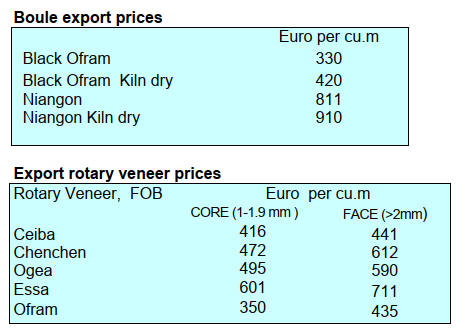
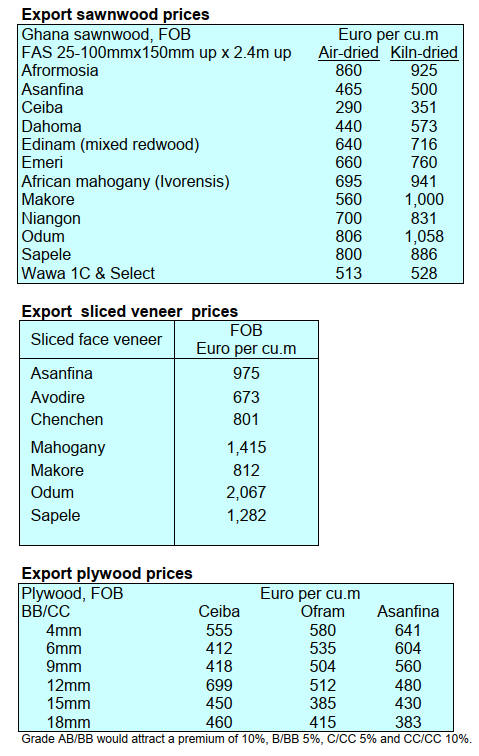
3. MALAYSIA
2023 GDP growth target
attainable
The indications are that Malaysia is set to achieve its 2023
GDP growth target of 4% to 5% given the positive growth
momentum according to the Statistics Department. The
Chief Statistician said consumer spending tends to be
above average in the fourth quarter which gives a final
boost to growth.
In other news, it was reported that the trade surplus
reached RM12.87 bil. in October marking the 42nd
consecutive month of trade surplus since May 2020.
Certification Council briefing on EUDR
The Malaysian Timber Certification Council (MTCC) has
reported on a briefing session for PEFC Chain of Custody
(CoC) certificate holders under the Malaysian Timber
Certification Scheme (MTCS).
The event served to update attendees on the current status
of MTCS implementation, explore the revised PEFC CoC
Standard and address concerns regarding the European
Union Deforestation Regulation (EUDR).
The briefing provided an overview of progress made in
implementing the MTCS, highlighting key achievements
and ongoing initiatives.
This included updates on the latest PEFC Chain of
Custody standard, PEFC Trademarks standard and MTCS
documents. MTCC highlighted the transition to the PEFC
ST 2020 by 31 December 2023. Any certificates that have
not fully transitioned by 1 January 2024 will automatically
be updated to “expired” on the PEFC database.
The most anticipated topic of the day was the update on
the EUDR. The regulation places strict reporting
obligations on companies placing wood products on the
EU market. MTCC reassured attendees that they are
working closely with PEFC to ensure MTCS-PEFC
certified timber products originating in Malaysia comply
with EUDR requirements. MTCC has committed to
disseminate the latest EUDR update to all stakeholders
through various communication channels and to
participate and contribute to the Task Forces related to
EUDR.
See:
https://mtcc.com.my/mtcc-updates-pefc-coc-holders-on-implementation-progress-and-eudr/
Environmental Compliance Audit
The November issue of the Sarawak Timber Association
(STA) Review reports on participation of STA members in
two pilot projects on an environmental compliance audit
(ECA). The Natural Resources and Environment Board
(NREB) and STA jointly organised a workshop to revisit
and refine findings from the pilot projects with the
objective of enhancing the Guidelines for the Natural
Resources and Environment (Audit) Rules, 2008 (NRE
(Audit) Rules, 2008) and ultimately facilitating the full
implementation of the Rules.
STA and NREB have been working for some time now,
through many training sessions, to get STA members
ready for full implementation of the NRE (audit) Rules.
Over the years of training, 112 internal environmental
auditors and 95 personnel in environmental quality
monitoring were trained.
The NRE (Audit) Rules, 2008 was formulated to compel
project proponents to undertake internal ECAs, thus
enhancing accountability in adhering to Environmental
Impact Assessment (EIA) Terms and Approval
Conditions.
The pilot projects reported that the majority of
stakeholders acknowledged that ECA had improved
environmental stewardship among project proponents,
contributing to improved compliance with EIA terms and
approval conditions. Notwithstanding that, issues such as
frequency of internal and external ECA and professional
audit fees were common throughout the pilot projects.
The group of participating companies urged the NREB to
develop a transparent fee structure matrix to effectively
streamline and clarify the charges involved in ECA,
ensuring that the companies’ transition towards self-
regulated compliance is not hindered by high costs.
Additionally, workshop participants also evaluated the
suitability and applicability of terms and conditions
outlined in the EIA approvals for both natural forests and
planted forests, with the aim of ensuring clarity and a
consistent understanding among different auditors.
See:
https://sta.org.my/images/STAReviewNov23.pdf
Sawn rubberwood export quota
The Ministry of Plantation and Commodities has approved
the sawn rubberwood export quota for 2024 at 50,000
cu.m. In connection with this all registered exporters are
encouraged to apply for a sawn rubberwood export quota.
The approval of the export quota is subject to MTIB's
management mechanism.
See:
https://www.mtib.gov.my/pengumuman/kuota-eksport-kayu-getah-bergergaji-2024
Malaysian International Furniture Fair
The Malaysian International Furniture Fair (MIFF) is
preparing for its 30th anniversary event scheduled for
March 1-4, 2024. The Fair, known for its significant
presence in the global furniture trade, has opened visitor
registration for the upcoming event.
This year's Fair is set to take place at the Malaysia
International Trade and Exhibition Centre (MITEC) and
World Trade Centre Kuala Lumpur (WTCKL). Over 650
exhibitors, both local and international, are expected to
participate, showcasing a wide array of trends, designs and
products.
See:
https://www.furninfo.com/furniture-industry-news/23175
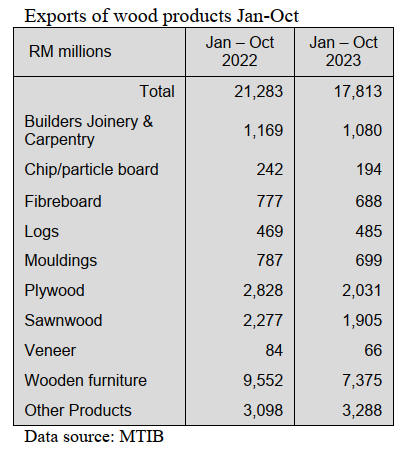
4.
INDONESIA
Export benchmark prices
for January 2024
The following prices apply for the period from 1 January
to 31 January 2024.
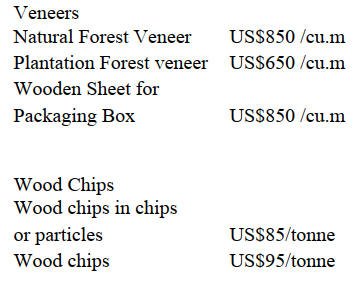
Processed Wood
Processed wood products which are leveled on all four
sides so that the surface becomes even and smooth with
the provisions of a cross-sectional area of 1000 sq.mm to
4000sq. mm (ex 4407.11.00 to ex 4407.99.90)
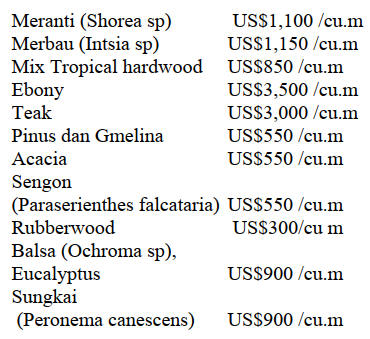
Processed wood products which are leveled on all
four
sides so that the surface becomes even and smooth with
the provisions of a cross-sectional area of 4000 sq.mm to
10000 sq.mm (ex 4407.11.00 to ex 4407.99.90)

See:
https://jdih.kemendag.go.id/pdf
Sustainable forest management yields positive results
Acting Director General for Sustainable Forest
Management at the Ministry of Environment and Forestry,
Agus Justianto, said in a statement the sustainable
management of forests throughout 2023 achieved several
positive results including maintaining the productivity of
forest to ensure the sustainability of forestry businesses.
Besides productivity, the accelerated implementation of
the multi-forestry business model also helped make forest
management increasingly inclusive by involving the
community.
Agus reported in 2023 planting and enrichment were
carried out on 667,780 hectares of the forest areas. The
figure was far above the target of 428,000 hectares. He
further disclosed that log production reached 58.13 million
cubic metres or 102% of the target.
He said "most log production comes from plantation
forests (89%) while from natural forests 7% comes from
BUMN Perhutani. In addition to timber the production of
non-wood forest products such as rattan, agarwood, latex
and bamboo also increased.
See:https://en.antaranews.com/news/
Investment in forestry rose in 2023
The Ministry of Environment and Forestry (KLHK)
recorded a growth of US$331 million in investment in the
forestry sector in 2023. Agus Justianto said that the
investment in the forestry sector exceeded the upstream
sector investment target which was US$107 million.
Agus explained that an investment of US$196 million for
the upstream sector namely Forest Utilization Business
Licensing (PBPH)/ Forest Concession Holder. Meanwhile,
downstream investment under the Forest Product
Processing Business Licensing (PBPHH) scheme reached
US$202.47 million.
The Ministry claimed that the growth in forestry sector
investment is aligned with good forestry governance. One
of the ways this was achieved was through information
systems which promote transparency in bureaucratic
processes. This helps to prevent high costs and ensures
accountability.
The information systems include the Forest Product
Administration Information System (SIPUHH), Timber
Legality Information System (SILK), Forest Product Raw
Material Fulfillment Plan Information System (SI
RPBBHH) and Online Single Submission (OSS).
See:https://emitennews.com/news/
and
https://www.msn.com/id-id/berita/
Association calls for SVLK promotion in international
markets
The Association of Indonesian Forest Concession Holders
(APHI) is hoping for more promotion of the Legality and
Sustainability Verification System (SVLK) in international
markets. Indroyono Soesilo, the chairperson of APHI, said
the SVLK system has gained worldwide recognition as a
reliable means of ensuring that the wood products
purchased are derived from sustainably managed forests.
The implementation of SVLK indirectly supports
Indonesia's Forestry and Other Land Uses (FoLU) Net
Sink 2030 by reducing the occurrence of deforestation and
illegal logging while simultaneously expanding the legal
timber market, he added.
Krisdianto, the Director of Forest Product Processing and
Marketing Development at the Ministry of Environment
and Forestry, stated that rebranding and strengthening the
SVLK is a strategic step in ensuring the legality and
sustainability of wood products. This is particularly
important as many countries are now implementing
regulations to ensure that imported wood products come
from sustainably managed forests and not from areas
deforested or degraded.
See:https://investor.id/business/350095/pengusaha-hutan-dukung-promosi-svlk-di-pasar-global
and
https://forestinsights.id/
Special economic zone for wood industry planned
The government plans to build a special economic zone
(SEZ) for the wood industry to improve the
competitiveness of Indonesian timber and furniture
products.
The chairman of the Sedulur Wood and Furniture
(Sekabel) Association, Setyo Wisnu Broto, said a special
economic zone for the wood industry is necessary as
Indonesia is losing international market share to Vietnam.
At a meeting with President Joko Widodo, Broto raised
several issues such as the challenges faced by the industry
as well as the challenge in meeting the requirements of the
EUDR. No details are available on which area will be
chosen for the wood industry SEZ as 30 potential locations
had been proposed.
See:
https://en.antaranews.com/news/302025/
and
https://economy.okezone.com/read/2023/
Furniture exports declining
The Indonesian Furniture and Crafts Industry Association
(HIMKI) reported a 28% year on year decline in furniture
exports in 2023 due to geopolitical tensions and high
inflation in export markets. Abdul Sobur, chairman of
HIMKI, stated that another contributing factor to the
decline in exports was the high price of domestic raw
materials.
Despite the decline in exports, Sobur is optimistic about
growth in the furniture and crafts industry but suggested
that the government's export target of US$5 billion in 2024
may need to be adjusted. “We are optimistic about the
future of Indonesia's furniture and craft industry.
Indonesia has the potential to become the world's
largest
producer,” he added.
See:
https://ekonomi.bisnis.com/read/
https://tubasmedia.com/nilai-ekspor-industri-mebel-indonesia-periode-2023-anjlok/
Forest entrepreneurs target Middle East market
Indonesian forestry businesses are looking to expand
markets in the Middle East by establishing a hub in Dubai.
According to Indroyono Soesilo, Chair of the Indonesian
Forestry Community Communication Forum (FKMPI) and
General Chair of the Association of Indonesia Forest
Concession Holders (APHI), export opportunities for
Indonesian forest products in in the region are immense
and that Dubai is perfect as a hub for the Middle East and
global markets.
In early December Indroyono, along with administrators
from FKMPI and APHI, held a meeting with the Fakih
Group of Companies, one of the largest in Dubai. The
meeting was made possible with the help of the Indonesian
Consul General for Dubai, Candra Negara and the
Indonesia Trade Promotion Center (ITPC) in Dubai. The
Fakih Group is constructing 50 hotels in the UAE and 40
hotels/apartments in Jeddah and they require a steady
supply of plywood, mouldings wood and furniture.
See:
https://forestinsights.id/pengusaha-hutan-indonesia-incar-pasar-timur-tengah-lewat-dubai/
Information system to boost performance
The Ministry of Industry hopes that the interconnection of
the foresy product information system with the Ministry of
Environment and Forestry (KLHK) will spur the
performance of the processed wood industry and national
furniture industry.
The Ministry of Industry agreed to exchange data between
the Ministry of Environment's Sustainable Forest
Management Information System (SIPHL) and the
Ministry of Industry's National Industrial Information
System (SIINas) with the facilitation of the Coordinating
Ministry for Maritime Affairs and Investment (Kemenko
Marves).
The Director General of Agro Industries at the Ministry of
Industry, Putu Juli Ardika, stated that the interconnection
between SIPHL KLHK and SIINas Ministry of Industry
will provide benefits to the government as policy makers
and also to wood industry players both in the upstream and
downstream sectors.
See:https://voi.id/en/economy/339642
Norway continues contribution to FOLU Netsink
for
Indonesia
Indonesia and Norway have agreed to continue
cooperation in reducing deforestation. Norway will
continue its US$100 million contribution to deforestation
reduction performance.
The signing of the commitment to continue the
contribution arranged by the Director of the Indonesian
Environmental Fund Management Agency, Joko Tri
Haryanto together with the Norwegian Ambassador to
Indonesia Rut Kruger Giverin and witnessed by the
Minister of Environment and Forestry, SitiNurbaya.
Minister Siti said that this addendum to the earlier
agreement is a huge achievement and was based on
verification of emission reductions from 2017–2018 to
2018–2019. Indonesia’s FOLU Net Sink 2030 Operational
Plan is also a reference and orientation for Norway in
providing support to Indonesia because 60% of emissions
come from the FOLU sector.
See:https://asiatoday.id/read/norway-
and
https://ppid.menlhk.go.id/berita/siaran-pers/7548/
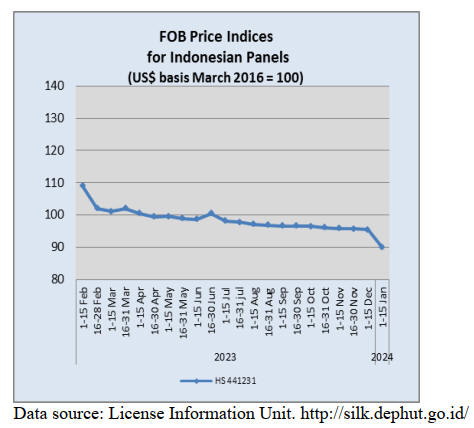
5.
MYANMAR
More challenges than opportunities
Significant challenges lie ahead in 2024 for both the
timber trade and forest conservation, primarily arising
from political developments since February 2021. The
military's refusal to convene parliament and allegations of
election fraud triggered months of widespread protests.
Many sought refuge in remote forest areas engaging in
armed conflict against the military-led State
Administration Council (SAC).
Although the ‘Prime Minister’ occasionally outlined
plans
for future elections to restore civilian governance, analysts
cast doubt on the likely holding of elections in the near
future.
The forestry sector is not immune to challenges. Even
before 2021, exporters of timber faced legality issues with
the many countries and agencies asserting that Myanmar
failed to meet international legality verification
requirements even at the first step of the harvesting.
Despite recognised reform efforts by major stakeholders
such as Forest Department and the Myanma Timber
Enterprise this has not proven sufficient for access to be
granted to major markets.
Forest conservation was prioritised from 2011 to 2020
under two civilian governments and the SAC continued
this by extending the logging ban until 2023. However,
due to expanding conflict areas, some forests have become
inaccessible posing challenges to forest governance and
log harvesting.
Harvesting from the northern natural forests is no longer
possible and this has led to a decline in teak log
availability. Millers with log stocks from earlier harvests
have attempted to meet the limited market demand.
Simultaneously, there's a lack of new orders for teak
products from the EU and USA, primarily due to sanctions
against the Myanma Timber Enterprise, the sole supplier
of logs to millers.
Despite timber from both government and private
plantations being allowed for export, there are no signs of
log exports from private plantations. It is assumed that this
is due to the private plantations being too young for
harvest as most were planted around 2006. Harvestable
timber from government plantations is traded only by the
Myanmar Timber Enterprise which is subject to
international sanctions.
To tackle concerns related to legality and sustainability the
Myanmar Forest Certification Committee (MFCC) has
prioritised forest certification for private plantations. As
indicated on their website the MFCC is actively
addressing the accreditation issue for Certification Bodies
under both the Myanmar Forest Certification Scheme
(MFCS) and Myanmar Timber Legality Assurance System
(MTLAS).
Despite the 2021 suspension of the PEFC-Endorsement
process MFCC is making efforts to certify private
plantations under the MFCS. However, promoting
products from private timber plantations poses an
additional challenge, particularly in competing with other
producing countries in Asia, Latin America and Africa.
Taking all current aspects into account the future of forest
conservation and the timber trade presents more severe
challenges than favorable opportunities for 2024.
Steep decline in border trade
The value of Myanmar’s border trade, which accounts for
the majority of the country’s foreign trade, dropped by
over US$100 million in the first nine months of the current
fiscal year compared to the same period of the previous
fiscal year, according to data from the Ministry of
Commerce. Myanmar’s border trade fell with all five of its
neighbours China, Thailand, Bangladesh, India and Laos.
With the exception of China, Myanmar’s imports from
those countries have also steadily declined.
See:
https://www.irrawaddy.com/news/burma/myanmar-border-trade-falls-100-million-in-april-december-amid-clashes.html
New Time Frame for depositing export earnings
The Central Bank of Myanmar (CBM) has ordered
exporters shipping goods outside Asia to deposit foreign
earnings in local banks within 90 days, up from a previous
requirement to do so within 60 days. Companies exporting
within Asia must deposit their earnings within 45 days
instead of 30 days.
Widespread international sanctions are affecting trade and
the private sector faces a significant challenge in accessing
foreign currency given the increasing pressure on foreign
reserves.
See:
https://www.thestar.com.my/aseanplus/aseanplus-news/2023/12/26/myanmar-central-bank-sets-new-timeframe-for-exporters-to-deposit-earnings
New ASEAN envoy appointed
Laos, the current chair of the Association of Southeast
Asian Nations (ASEAN), has appointed a veteran
diplomat as its special envoy to Myanmar ahead of the
bloc’s foreign ministerial retreat in Luang Prabang later
this month.
It has been reported that Lao Foreign Minister,
Saleumxay
Kommasith, appointed Alounkeo Kittikhoun, a former
Vice Minister for Foreign Affairs, as special envoy.
Alounkeo is charged with pushing forward ASEAN’s
Five-Point Consensus Peace Plan which calls for the
immediate cessation of violence and inclusive political as
well as the provision of humanitarian aid to populations in
need.
See:
https://www.irrawaddy.com/news/myanmars-crisis-the-world/asean-envoy-from-laos-visits-myanmar-junta-chief.html
and
https://thediplomat.com/2024/01/asean-chair-laos-appoints-special-envoy-on-myanmar/
6.
INDIA
Veneer and plywood price
indices move higher
The annual rate of inflation based on all India Wholesale
Price Index (WPI) in November was 0.26 compared to
minus 0.52% recorded in October 2023. The positive rate
of inflation in November 2023 was primarily due to
increases in prices of food, minerals, machinery and
equipment, computers, electronics and optical products,
motor vehicles, other transport equipment and other
manufactured products.
The index for manufacturing increased to 140.4 in
November 2023 from 140.3 in October. Out of the 22 NIC
two-digit groups for manufactured products prices in 8
groups increased, 10 groups decreased ands 4 groups
remained unchanged. Some of the groups for which prices
increased were other manufacturing, manufacture of food
products, trailers and semi-trailers, fabricated metal
products except machinery and equipment, wood and of
products of wood and cork.
See:
https://eaindustry.nic.in/pdf_files/cmonthly.pdf
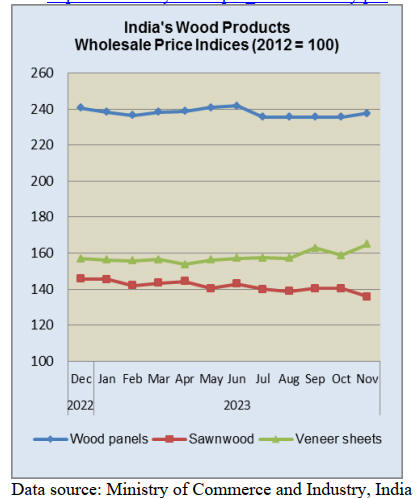
Consumers looking for quality and reliability
The Indian economy is expanding fast and consumers with
greater disposable incomes are now looking for quality
products. Wood products such as particleboard, MDF,
plywood and many other items are being imported from
China, Vietnam, Thailand, Indonesia and Europe.
At present these products do not carry the Indian
Standards Institute (ISI) mark but this will soon be
mandatory. The implementation of the new Bureau of
Indian Standards (BIS) is coming and is likely to create
challenges for exporters. If overseas shippers cannot
secure the ISI mark it is anticipated there will be an
increase in demand for domestic products.
For the past two and a half months extensive discussion
across various timber sectors in India involving
associations, manufacturers and importers have been
conducted and overseas manufacturers, Indian and foreign
have started applying for ISI recognition.
According to the BIS, the new Standard requirements will
come into force on 24 February 2024. Of the roughly
3,800 wood processing mills in the formal sector only a
third have, as of 15 January 2024, concluded the process
to secure BIS certification.
Many are asking what will be the situation with the large
number of domestic industries which do not have an ISI
mark for their products? Will they be able to sell their
products? What will happen to overseas shippers of
products if they don’t get certification before the time
limit?
Plyreporter has said BIS officials are visiting various
manufacturing clusters to assist with the process of
obtaining ISI marks. Plyreporter suggests foreign
companies will typically require at least 6 months to
complete the certification process. Analysts anticipate a
shortage of imported products in the market and it remains
to be seen whether the certification period for international
suppliers will be adjusted.
The Federation of Indian Plywood and Panel Industry
(New Delhi), the largest plywood federation, has written a
letter to the Joint Secretary in the Ministry of Commerce
and Industry.
The letter includes a request for extension of
implementation of the new requirements for woodbased
panels, plywood and wooden flush doors, shutters and
resin treated compressed wood Laminate products. The
Federation says the Indian plywood manufacturing sector
has many SMEs and MSMEs with very few large players.
The small manufacturers cater to the lower segment of the
market and the product is mainly a ‚use and throw‘
product and that this segment is largely unregulated in
terms of Standards.
The Federation recommends developing Indian standards
for utility grade products for manufactures who are unable
to meet the criteria set in the new Standards. The
Government is yet to respond to the Federation.
Approximately 1,500 containers of panel products and
decorative materials come to India from different
countries. So an up-tick is expected in the demand for
domestic products, if the domestic players are ready there
is a big opportunity for them to seize.
See:
https://www.plyreporter.com/article/153778/imported-panel-products-supply-may-affect-post-bis-qco
Nature-based products for government projects
To advance ‘Green Building‘ attributes and the ‘Green
Rating for Integrated Habitant Assessment‘ ratings the
Indian Council of Forestry Research and Education
(ICFRE) has suggested the promotion of woodbased and
bamboo-based components in building projects undertaken
by the Government.
In a letter to the Chief Engineer, Civil Construction Unit
of MoEFCC, the Director-General of ICFRE suggested
that it would be desirable for the Government of India to
lead by example when it comes to building projects and
adopt best practice with regards to nature-based products
and solutions.

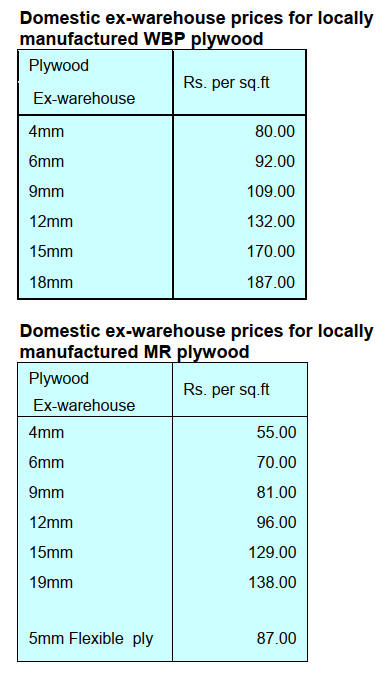
7.
VIETNAM
Wood and wood product (W&WP) trade highlights
W&WP exports in December 2023 are estimated at
US$1.25 billion, up 2.4% compared to November 2023
but down 4.7% compared to December 2022. In particular,
WP exports are estimated at US$872 million, up 0.5%
compared to November 2023 but down 0.2% compared to
December 2022.
In 2023 total W&WP exports were valued at
US$13.4 billion, down 16.5% compared to 2022.
Of this, WP exports are estimated at US$9.1
billion, down 17.5% compared to 2022.
W&WP exports to the EU market in December
2023 amounted to US$52 million, down 26.8%
compared to December 2022.
In 2023 W&WP exports to the EU market
totalled at US$447.2 million, down 31.8%
compared to 2022.
In December 2023 woodchip exports earned
US$170 million, down 24.5% compared to
December 2022.
Overall in 2023, wood chip exports contributed
US$2.2 billion, down 18.5% compared to 2022.
In December 2023 Vietnam spent US$200
million for W&WP imports, down 1.2%
compared to November 2023 and down 3.2%
compared to December 2022.
Overall in 2023, W&WP imports stood at
US$2.186 billion, down 27.8% compared to
2022.
Vietnam's imports of poplar wood in December
2023 were 30,600 cu.m worth US$11.6 million,
up 1.5% in volume and 1.2% in value compared
to November 2023. Compared to December
2022, it increased by 42% in volume and 45.5%
in value. Overall, in 2023, poplar imports
amounted to 324,400 cu.m, worth US$ 131.9
million, down 11.9% in volume and 26.2% in
value compared to 2022.
Vietnam’s imports of raw wood (Logs and
sawnwood) from Africa in November 2023
reached 64,690 cu.m with the value of US$25.10
million, up 23.4% in volume and 30.3% in value
compared to October 2023 but down 51.9% in
volume and 51.3% in value compared to
November 2022.
Overall, in the first 11 months of 2023, imports of raw
wood from Africa reached 675,045 cu.m, at a value of
US$264.35 million, down 43.4% in volume and 40.5% in
value over the same period in 2022.
2023 W&WP exports to the EU decreased sharply
December 2023 W&WP exports to the EU fell 26.8%
compared to December 2022. In 2023 W&WP exports to
the EU totalled US$447.2 million, down 31.8% compared
2022. With the EU economic stagnation in 2023
demand for non-essential commodities including W&WPs
dropped significantly.
In 2023 wooden furniture accounted for 77% of total
W&WP exports to EU contributing US$306.7 million,
down 34.6% compared to 2022. Wooden living and dining
room furniture sub-groups earned,US$137.4 million, down
1%; wooden-frame seats US$112.1 million, down 33%,
bedroom furniture US$35.3 million, down 17.3%.
According to Eurostat the value of EU wooden furniture
imports in the first nine months of 2023 reached 5 million
tonnes, worth EUR16.6 billion (US$18.4 billion), down
8.5% in volume and 10.6% in value against the same
period in the previous year.
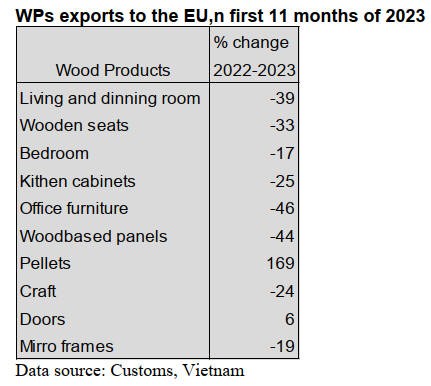
Despite facing many difficulties in demand and new
regulations in the market the EU is still an important
export markets for Vietnamese wood and wood products
and has a more room for development.
In the first 11 months of 2023 W&WPs exports from
Vietnam to France accounted for US$90 million of EU
imports, down 23.8% over the same period in 2022
followed by the Germany, down 47.9%, Netherlands,
down 18.8%, Belgium, down 41.1% and Spain down 9.8%
Wood chip exports declined in 2023
In December 2023 woodchip exports were valued at
US$170 million, down 24.5% compared to December
2022. In 2023 woodchip exports reached US$2.2 billion,
down 18.5% compared to 2022.
In the first 11 months of 2023 China was the top market
for chips consuming US$1.3 billion of woodchips from
Vietnam, down 23.8% over the same period in 2022 and
accounting for 64% of Vietnam’s total woodchip exports.
Next to China, Japan purchased chips worth US$562
million, down 11.4% over the same period in 2022, S.
Korea US$80.6 million, down 6.5%, Indonesia US$59.7
million, up 648%, Taiwan P.o.C US$10 million, down
41.5%.
With newly established paper mills in Guangxi and Fujian
China’s woodchip demand for pulp and paper production
is expected to grow further. Vietnam, with the advantage
of short transportation distance aims to take advantage of
this demand.
Sawnwood imports from Africa
In November 2023 Vietnam imported 64,490 cu.m of raw
wood (logs and sawnwood) from Africa with a value of
US$25.10 million, up 23.4% in volume and 30.3% in
value compared to October 2023 but down 52% in volume
and 51% in value compared to November 2022.
In the first 11 months of 2023 imports of raw wood from
Africa reached 675,040 cu.m with a value of US$264.35
million, down 43.4% in volume and 40.5% in value
compared to the same period in 2022.
In 2023 there was a decline in domestic wood
consumption. The downturn in the real estate market is
said to be the major reason behind the dropped in raw
wood imports. In 2024, the real estate market is forecast to
recover. However, as Vietnam is reinforcing its control
over tropical hardwood imports to assure timber legality,
imports of raw wood from Africa will remain low.
African timber suppliers
Cameroon was the top supplier of tropical hardwood to
Vietnam in November 2023 reaching 36,470 cu.m at a
value of US$16.60 million, up 18.3% in volume and
31.1% in value compared to October 2023 but down
54.1% in volume and 50.7% in value compared to
November 2022.
Overall, in the first 11 months of 2023, imports of raw
wood from Cameroon reached 391,480 cu.m at a value of
US$171.28 million, down 29.5% in volume and 27.1% in
value over the same period in 2022.
In November 2023 wood imports from Angola, as second
top supplier, decreased by 12.7% in volume and 15.8% in
value compared to October 2023, reaching 2,800 cu.m
with a value of US$729,000.
Over the first 11 months of 2023 imports from Angola
reached 49,530 cu.m with a value of US$13.19 million,
down 13.3% in volume and 10.8% in value over the same
period in 2022.
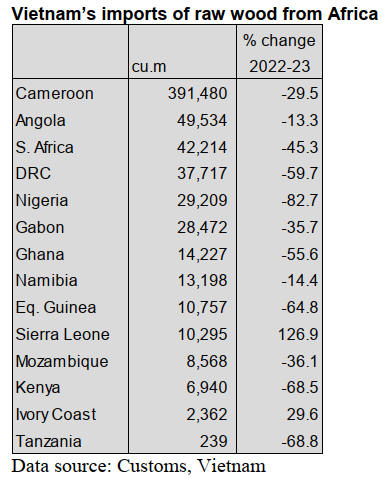
Categories of imported wood
In November 2023 imports of raw wood from Africa
increased due to an increase in sawnwood imports
compared to October 2023. In contrast, imports of logs
fell.
Over the first 11 months of 2023, sawnwood imports from
Africa reached 322,720 cu.m, with a value of US$125.69
million, down 32.0% in volume and 31.3% in value
compared to the same period in 2022.
The average price of imported sawnwood in November
2023 stood at US$382 per cu.m, up 8.7% from October
2023 but down 4.3% from the same period in 2022.
Overall, for the first 11 months of 2023, the average
import price of sawnwood from Africa stood at US$389
per cu.m, up 1.1% from the same period in 2022.
Imports of padouk sawnwood in November 2023
increased by 45.2% in volume and 43.0% in value
compared to October 2023, while that of pachy was up by
230.6% in volume and 435.6% in value.
Over 11 months of 2023 imports of sawn padouk wood
decreased 16.2% in volume. Pachy sawnwood imports
decreased by 55.3% in volume and 55.6% in value.
In November 2023, tali imports soared by 81.0% in
volume and 67.4% in value compared to October 2023,
but were down by 27.9% in volume and 35.1% in value
compared to November 2022.
Over the first 11 months of 2023, tali remained the top
imported sawnwood from Africa reaching 154,040 cu.m at
a value of US$69.40 million, down by 12.1% in volume
and 9.3% in value year on year.
Log mports of logs from Africa to Vietnam in November
2023 reached 26,710 cu.m, at a value of US$10.61
million, down by 14.1% in volume and 10.0% in value
compared to October 2023 and down by 65.2% in volume
and 62.8% in value compared to November 2022.
The average import price of logs from Africa in November
2023 stood at US$397 per cu.m, up 4.8% against October
2023 and up 7.0% compared to November 2022.
In the first 11 months of 2023, the average import price of
logs stands at $393 per cu.m, up 8.2% from the same
period in 2022.
In November 2023, imports of tali, pachy and sapele wood
dropped against previous the month. In contrast, imports
of mukulungu, teak and eucalyptus soared.
Over the 11 months of 2023 imports of most logs from
Africa fell against the same period in 2022.
2024 will be challenging for Vietnam's wood sector
2024 is forecast to remain challenging for the wood
industry given several issues affecting the sustainability of
production and export. Statistics from the Ministry of
Agriculture and Rural Development show that the sector’s
exports reached US$14.39 billion last year, down 15.8 per
cent year-on-year.
Major export markets have increasingly strict regulations
on product legality and sustainability. Specifically, the EU
Deforestation Regulation (EUDR) requires products
imported into this market to prove legality,origin and that
they have not added to deforestation or forest degradation.
Along with the EU, many other markets have also set new
and strict policies causing many difficulties for wood
exports. The US market requires an increase in the
frequency of investigations applying trade remedies to the
industry and also compliance with labour and employment
regulations. Japan also requires wood products to have
sustainability certificates.
German importers require Vietnamese exporters to
provide additional certificates related to product origin,
employment status, wages, waste treatment and other
related certificates. Meanwhile, Canada currently tends to
put forward more environmental regulations in its product
design, manufacturing and marketing strategies.
Recently, the Canadian Government published a
regulatory framework to establish mandatory requirements
for recycled content and labelling for plastic products
which will impact most of Vietnam’s export commodity
groups, from consumer goods packaging to other key
export sectors.
See:
https://vietnamnet.vn/en/2024-remains-challenging-for-wood-sector-experts-2234673.html
8. BRAZIL
Businesses in Mato Grosso
prepare for 2024
During the Ordinary General Meeting (OGM) of industrial
entrepreneurs from the forest sector hosted by
SINDUSMAD (Union of Timber Industries in the North
of the State of Mato Grosso) goals for 2024 were
discussed and the performance in 2023 were evaluated.
CIPEM (Center for Timber Producing and Exporting
Industries of Mato Grosso State) presented the programme
and events planned to promote the production potential of
the forest sector in Mato Grosso to expand national and
international trade in forest products.
Initiatives such as the 5th edition of Forest Day scheduled
for the first half of 2024 were highlighted. This event will
demonstrate activities in a Sustainable Forest Management
area including the process of conserving native vegetation,
harvesting, wood transportation, sawmilling and
production of finished forest products. In addition,
participation in international fairs in France and Brazil are
planned to showcase the potential of timber produced in
the State.
It was reported that the forest sector has made significant
progress such as the inclusion of a credit line for
sustainable forest management in the Federal
government's Safra Plan 2023/2024, launched in June
2023. Financing for forest resource management is
provided for in the RenovAgro Programme for a period of
up to two years at interest rates of around 7% per year.
Work on the’ Safe Base’ project focused on worker health
and safety was also reported.
See:
https://cipem.org.br/noticias/expansao-de-mercado-para-produtos-florestais-de-mato-grosso-sera-fortalecida-em-2024
Environmental challenges addressed during COP 28
Discussions at COP 28 in 2023 highlighted the need for a
collaborative approach to conserve biodiversity and
mitigate the environmental impacts of human activities on
the environment. Representatives from the forest sector in
Mato Grosso State stressed the importance of
differentiating between legal and illegal deforestation and
pointed out the National Institute for Space Research
(INPE) identifies areas destined for production activities.
The forest sector supports the crucial role of sustainable
forest management SFM in preservation, generating goods
and services and promoting local socio-economic
development.
INPE reported that in just one year the state of Mato
Grosso lost approximately 2,086 km² of forest and
emphasised that SFM is emerging as a powerful solution.
With a total area of 4.7 million hectares of managed
forests in private areas a SFM strategy not only preserves
the designated areas but also generates goods and services.
The forest sector of Mato Grosso state reiterated its
commitment to sustainable practices, investment in
monitoring technologies and engagement in initiatives to
expand areas under SFM offering a balanced approach
between conservation and sustainable development.
See:
https://simenorte.com.br/noticias/cop-28-desafios-ambientais-em-mato-grosso/
Promoting furniture exports to Peru
Peru, with its diversified economy and GDP growth of
8.7% in 2022, is a promising market for the Brazilian
furniture industry. The sectoral project ‘Brazilian
Furniture’, an initiative of ABIMÓVEL (Brazilian
Furniture Industry Association) in partnership with
ApexBrasil (Brazilian Trade and Investment Promotion
Agency), aims to reverse the decline in wood product
exports to Peru by bringing together buyers and partners in
the region.
Although Peru has a diversified economy and is the fifth
largest in Latin America, the Study of Opportunities for
the Brazilian Furniture and Mattress Exporter - Target
Country: Peru, highlights challenges in Peru's economic,
cultural, consumer and logistical infrastructure requiring
assertive strategies for the expansion of Brazilian
companies.
The Peruvian market, with furniture consumption at
US$511 million in 2022, is mainly fueled by imports
(37.9% of the market) representing an opportunity for the
Brazilian industry. Although Brazil is the second largest
supplier the 25% drop in exports between 2018 and 2022
indicates the need for action and innovation.
ABIMÓVEL highlighted the importance of a diversified
product mix and quality given the growing demand for
stylish and comfortable furniture. Marketing and sales
strategies adapted to the local market, the influence of e-
commerce and a preference for cost-effectiveness and
recognised brands are crucial for the successful presence
and expansion of Brazilian companies in Peru.
See:
http://abimovel.com/exportacoes-brasileiras-de-moveis-e-colchoes-para-o-peru-podem-crescer-ate-67-nos-proximos-anos/
ABIMCI/PEFC discuss certification and EUDR
In early December 2023 ABIMCI (Brazilian Association
of the Mechanically Processed Timber Industry) hosted a
meeting with representatives of PEFC International along
with representatives of FIEP (Federation of Industries of
Paraná State) to discuss optimising forest certification for
small forest owners.
ABIMCI stressed the importance of collaboration and
exchange of information to better understand the new
market regulations especially the EUDR. Representatives
from PEFC International said the PEFC Standards address
aspects of protecting forests and halting deforestation,
addressing climate change and protecting sustainable
livelihoods which is at the core of the EU Timber
Regulation and that PEFC is committed to achieving
alignment with the EUDR through Standard adjustments.
PEFC shared data on its global presence in 56 countries
reporting that as of September 2023 more than 288 million
hectares of forest was PEFC certified (80% of global
forests, of which Brazil accounts for 35%) excluding
Russia and Belarus.
Source: ABIMCI News December 2023
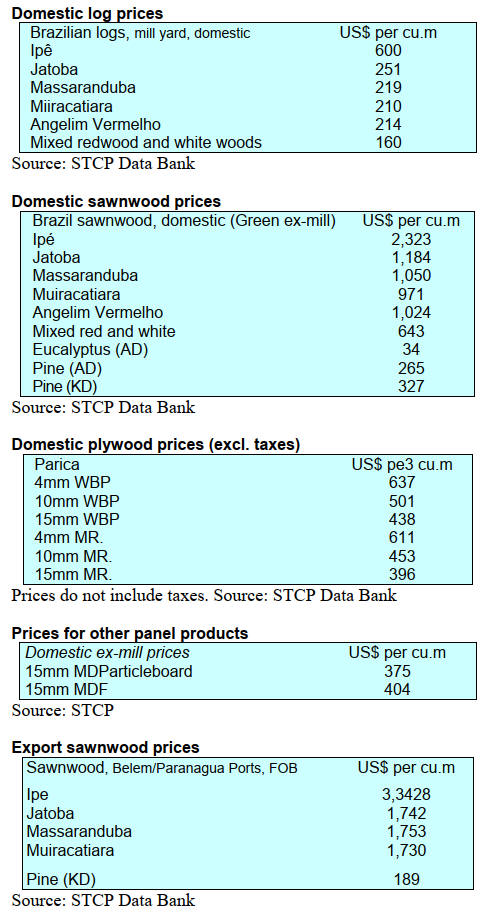
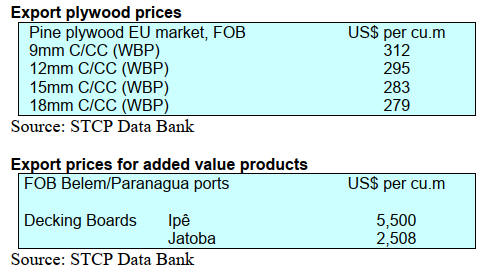
9. PERU
Shipments of
construction products
Shipments of wood products for construction between
January and October 2023 totalled US$4.4 million
representing a growth of 29% compared to the same
period of the previous year (US$ 3.4 million) as reported
by the Association of Exporters (ADEX).
This increase is partly explained by greater demand from
Mexico which increased from US$0.15 million in 2022 to
US$0.2 million in 2023 (January-October). The main
destination was, however, the US (US$1.8 million)
representing a slight increase of 3%.
According to figures from the ADEX Data Trade
Commercial Intelligence System there were exports to
Chile (US$0.87 million +179%), Dominican Republic
(US$0.16 million, +168%) and France (US$0.12 million -
73%). The most notable item in these ten months of the
year was carpentry products and items for construction
(US$1.8 million), which maintained a similar level to
2022 (variation of 0.3%) and a share of 41%.
Likewise, doors and their frames (US$0.69 million), other
structural engineered wood products (US$ 0.67 million),
others for mosaic floors (US$0.31 million), other doors
and their frames (US$0.31 million) were shipped along
with tropical wooden frames (US$0.17 million). These
other products accounted for around 5% of the total
shipped.
The value of shipments of the products above was
surpassed by sawnwood (US$35.6 million) and semi-
manufactured products (US$9.4 million).
In addition, firewood and charcoal were exported (US$4.1
million), manufactured products (US$3.9 million),
furniture and its parts (US$3.45 million), veneers and
plywood (US$2.2 million) and veneersheets (US$ 1.4
million).
Peru and Brazil to address CITES listing of
Shihuahuaco and Tahuarí
In the last week of December the National Forestry and
Wildlife Service (SERFOR) and the Brazilian Institute of
the Environment and Renewable Natural Resources
(IBAMA) presented their proposals on the implementation
of Shihuahuaco (genus Dipteryx) and Tahuarí (genus
Handroanthus) in Appendix II of CITES.
At the meeting they proposed developing collaboration
mechanisms between trading countries to optimise their
action in order to guarantee the sustainable use of these
important forest species.
IBAMA expressed its interest and willingness to share
information with SERFOR and proposed establishing
periodic meetings starting in January 2024. During its
presentation IBAMA highlighted the strategies it has
developed for identifying forest species.
The meeting was held at the headquarters of the Peruvian
Foreign Ministry in Lima and had the participation of
representatives of SERFOR, as CITES Administrative
Authority; of the Ministry of the Environment of Peru, as
CITES Scientific Authority; the Forestry and Wildlife
Resources Supervision Agency-OSINFOR, as CITES
Enforcement Entity and from Brazilian officials through
virtual connection.
See: https://www.gob.pe/institucion/serfor/noticias/886345-intercambio-internacional-de-experiencias-sobre-la-inclusion-del-shihuahuaco-y-tahuari-en-el-apendice-ii-de-
la-cites
Measuring carbon in agroforestry systems
At the end of December the National Forestry and Wildlife
Service (SERFOR) of the Ministry of Agrarian
Development and Irrigation and the Agrofor Project
(CIFOR – ICRAF) held a course ‘Quantification of carbon
stored in small-scale agroforestry and forestry practices in
the scope of CUSAF’ aimed at strengthening the
capacities of specialists from the Regional Governments of
Amazonas, Loreto, San Martín and the staff of the
SERFOR headquarters on concepts and criteria to
determine the amount of carbon stored in agroforestry and
small-scale forestry practices scale.
Fifty-two people were trained to understand of the subject
and be prepared to effectively apply carbon measurement
techniques in real situations and evaluate agroforestry
systems such as the case of Transfer in Use contracts for
Systems.
See:
https://www.gob.pe/institucion/serfor/noticias/888710-serfor-y-el-proyecto-agrofor-fortalecen-capacidades-de-funcionarios-en-la-medicion-de-carbono-en-sistemas-agroforestales
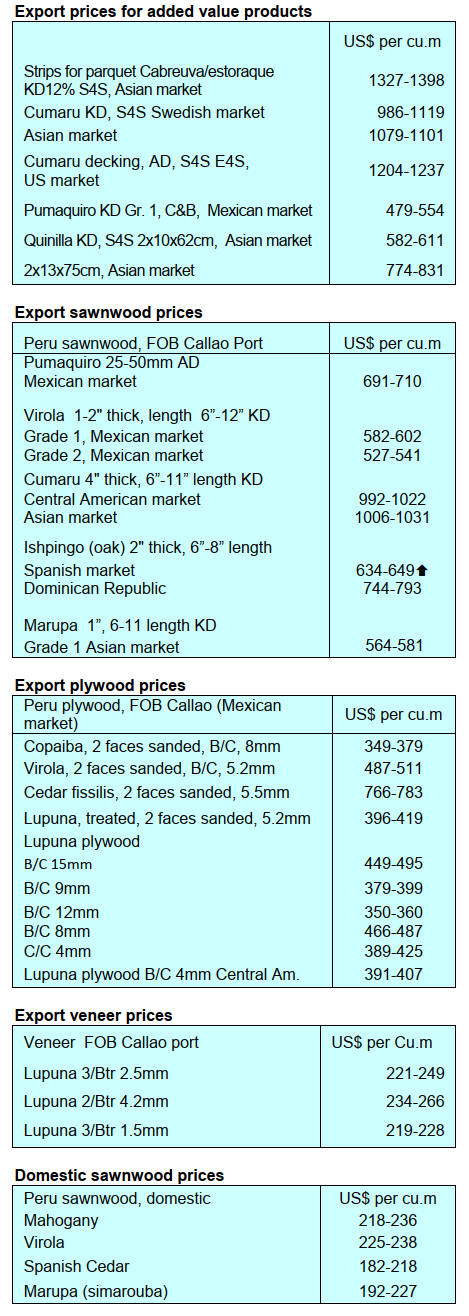
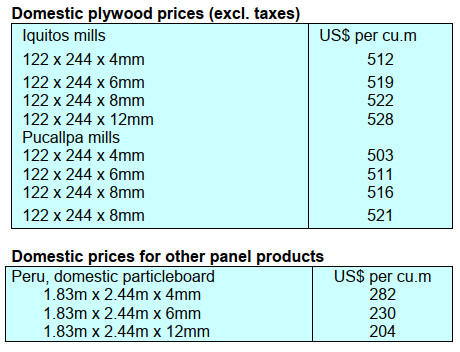
|